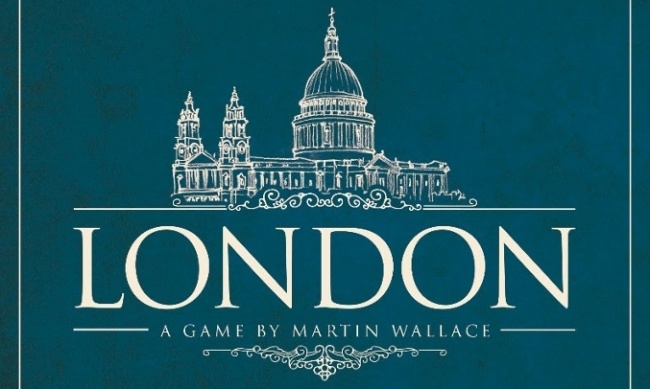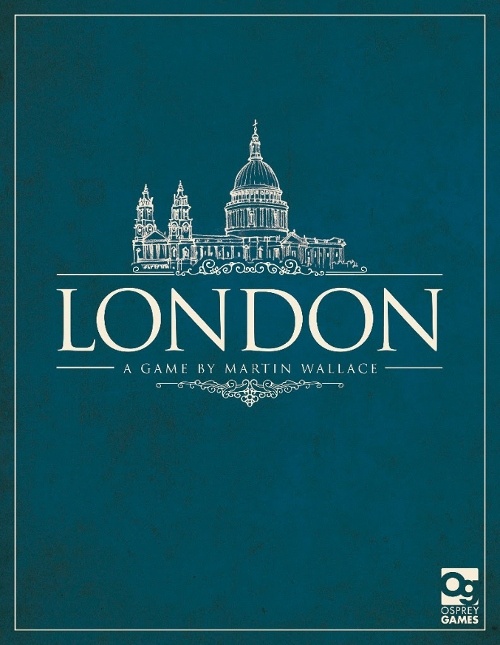London (Second Edition)
Publisher: Osprey Games
Release Date: October 19, 2017
Price: $55.00
Game Designer: Martin Wallace
Artist(s): Przemyslaw Sobiecki, Natalia Borek, Mike Atkinson
Format: Card/Board Game
Number of Players: 2 to 4
Playing Time: 60 to 90 minutes
ISBN: 978-1-4728-2222-2
Age Rating: 14+
ICv2 Rating: 4.5 Stars out of 5
Several years ago, Martin Wallace, a longtime designer of quirky games, came out with a game about the rebuilding of London after the Great Fire. The game was very abstract, and made no effort to have things happen in any particular order, but players used cards based on real buildings and real-ish events to try to score points for their version of the process. The poor of London play a part in the game, because you have to find a way to work around them, or lose points due to the penalties for having too many poor folks.
While not as detailed or difficult as Lisboa, the game had a considerable appeal in the same genre, and was a favorite of some gamers. Much more detailed than a light family game, but not as dense as the most serious games, it helped to define the "middle" level of games.
Now, London is back in print in a revised edition through Osprey. This time, the game is based on management of cards from two different decks, the main city deck and the borough deck. You play cards and accumulate money, prestige, and poverty points.
Instead of a map of London, as in the original, the boroughs are made even more abstract by reducing them to a special deck of cards, and for each player only the borough more recently purchased is active, in terms of most of its benefits and penalties. That creates a major change in the play of the game which makes it both more strategic and more challenging. These cards have a purchase cost, effects when played, effects when the city is activated, and possible victory point effects at the end of the game, as well as side-effects based on the borough’s position relative to the Thames… a lot of things to consider every time you purchase one. Bank loans, a big part of the game early on, are very expensive, both in money and in poverty points, so there’s a serious challenge to pay them back as quickly as possible. Poverty points, by themselves, won’t lose you the game, but their effect is relative. Whoever ends the game with the fewest poverty points avoids a penalty, and all others are penalized relative to that player.
The main mechanic remains the same as in the original. You are playing cards face up to create stacks, the most recent of which can be activated when you "run" the city to gain money or prestige, or reduce poverty. Most cards are one-use. The difficulty is that each time you activate cards in this fashion, you gain poverty points. The more stacks you create, the more they cost you in terms of poverty points, but the larger number of stacks also increases your flexibility and potential gains. That tradeoff is one of the greatest challenges in the game. The timing of when you run the city, along with the new borough mechanics, will determine your success.
One minor component quibble has to do with the borough cards. They are an odd size, and will be awkward to sleeve. Also, since they replaced most of the purpose of the board, replacing the map of London with a scoring track seemed odd, although easier to work with than a bunch of point tokens.
The game length is accurate, although teaching games will run longer, and for some players there is a danger of analysis-paralysis, due to the borough strategies and their interaction with your city cards.
The artwork in the game is, if anything, a bit simpler than in the original, because the board no longer has a big map on it. The box is similar to older "bookshelf" boxes, but hinged, and the game box is quite full, with board, cards and various tokens, making it a nice fit on shelves. Osprey spent money on contents, rather than an oversized pictorial box. Overall, the price is appropriate for what you get, but some may not be attracted to the simpler box design. That would be a shame, because this is an excellent game with tricky but interesting strategies.
--Nick Smith: Library Technician, Community Services, for the Pasadena Public Library in California.

ICv2 Stars: 4.5 (out of 5)
Posted by Nick Smith on November 15, 2017 @ 3:24 am CT



